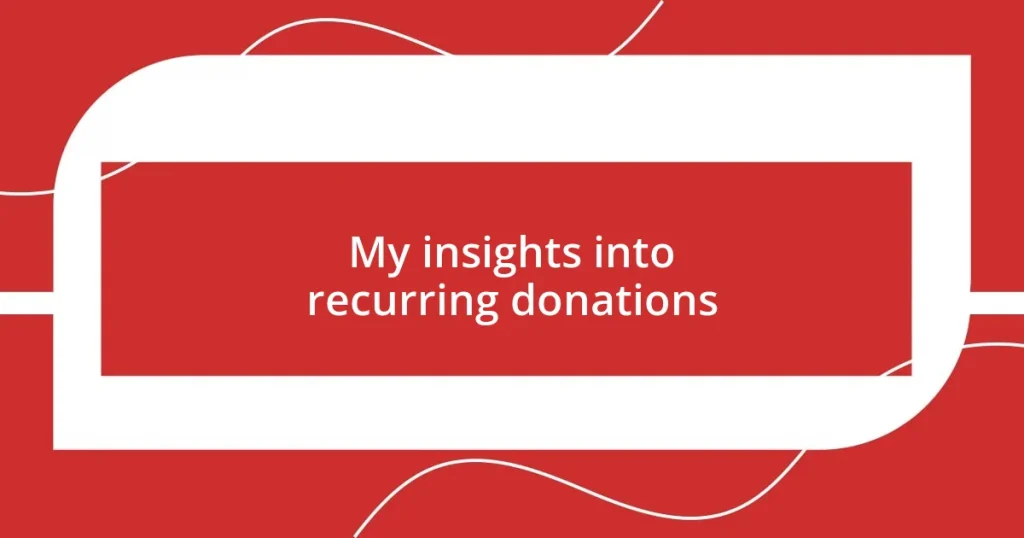Key takeaways:
- Recurring donations provide financial stability, enabling organizations to plan and expand their programs effectively.
- They foster deeper emotional connections between donors and causes, transforming supporters into advocates.
- Optimal platforms for recurring donations enhance donor experience and engagement through user-friendly interfaces and personalized communication.
- Communicating the impact of donations and building a community around giving are essential strategies for encouraging long-term support.
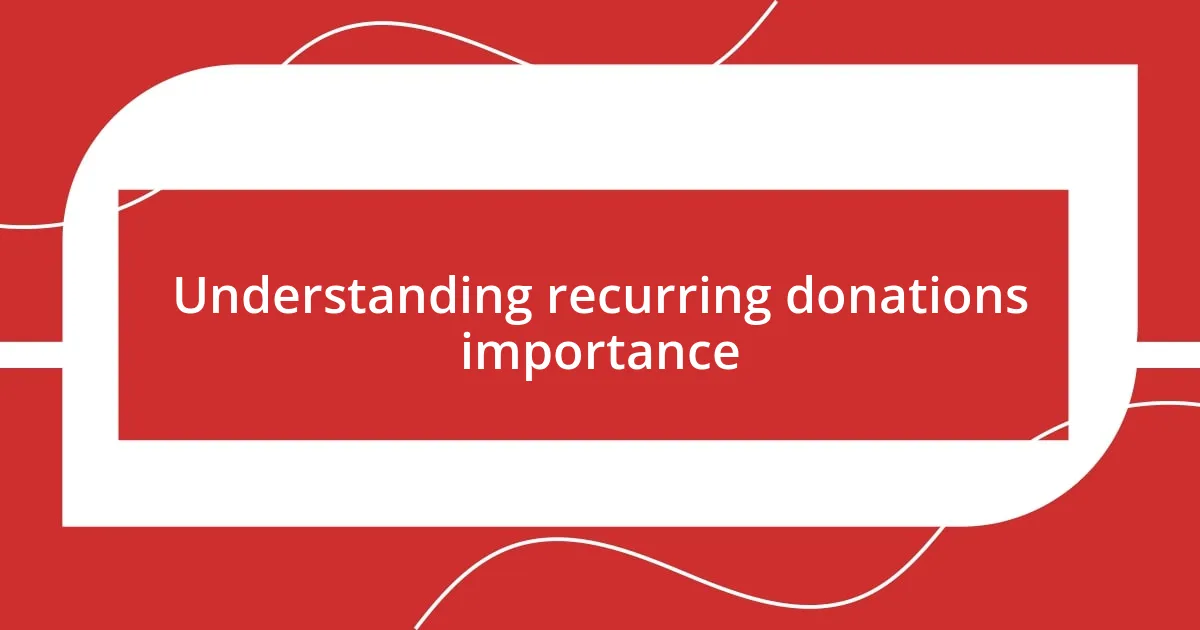
Understanding recurring donations importance
Recurring donations play a crucial role in establishing a steady revenue stream for organizations. I remember hearing a nonprofit leader share how predictable income from monthly donors allowed them to plan their programs better, reducing stress and enabling them to focus on their mission. Imagine you could count on a certain amount of money every month; how would that change how you operate?
Moreover, the emotional connection between donors and the causes they support often deepens with recurring giving. When I set up my first monthly donation, I felt a sense of commitment that a one-time contribution just couldn’t match. It’s like saying, “I believe in you, and I’m here for the long haul.” Donors often feel that they’re part of something bigger, fostering a community of support that transcends a single act of generosity.
Lastly, consider how recurring donations can lead to increased donor engagement. Have you ever wondered why some charities maintain loyal supporters while others struggle? From my experience, when organizations send heartfelt updates or invite donors to exclusive events, it nurtures that relationship. This ongoing interaction transforms donors into advocates, amplifying their impact and creating a vibrant network of passionate individuals committed to making a difference together.
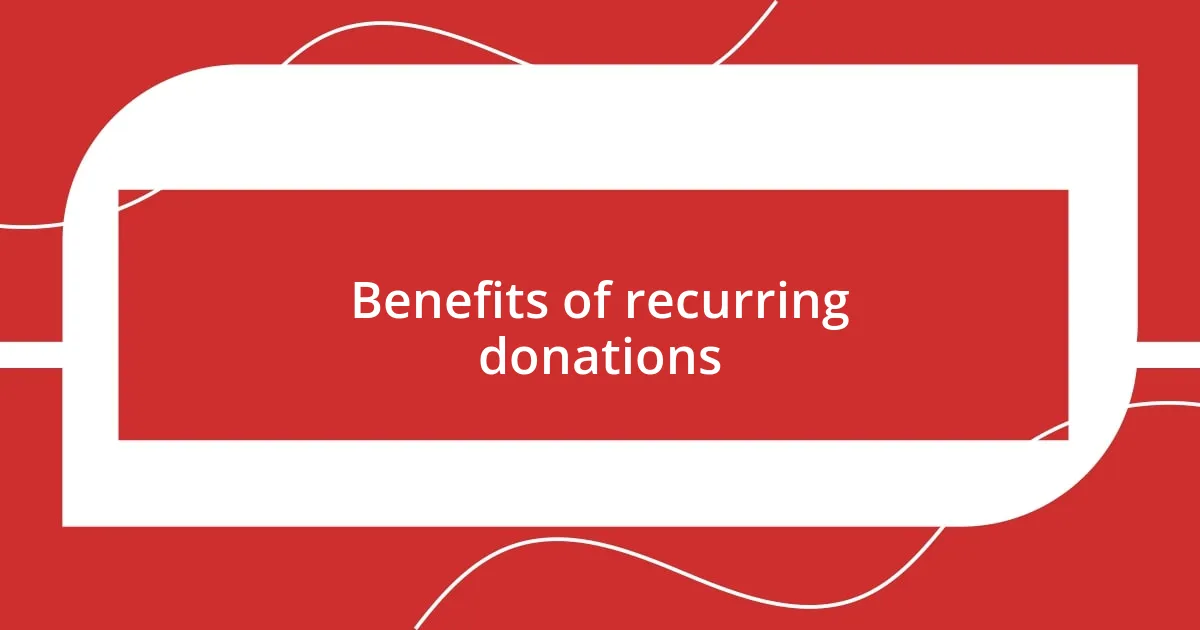
Benefits of recurring donations
Recurring donations offer remarkable benefits for both organizations and donors alike. From my own perspective, one major advantage is the ability to forecast expenses and allocate resources effectively. I recall a small charity struggling to maintain their outreach programs until they implemented a recurring donation model. Suddenly, they had the financial stability they needed to expand their efforts. This kind of reliable funding not only enables organizations to plan ahead but also empowers them to tackle new challenges without the constant worry of raising funds.
Another key benefit lies in the enhanced donor experience. I find that when I commit to a monthly donation, it creates a deeper sense of satisfaction. It shifts my mindset from a one-time giver to an ongoing supporter. This transformation can lead to building stronger emotional ties with the cause. For example, after regularly contributing to a local shelter, I started volunteering my time there, driven by the sense of belonging that came from my donations. It’s amazing how that bond can evolve, making contributions feel more personal and impactful.
Additionally, recurring donations often lead to increased overall contributions. It’s fascinating to see how a little consistency can lead to substantial growth over time. My friend shared her experience with a charity that encouraged an annual increase in donation amounts. As she continued her monthly contributions, she felt more compelled to up her game, ultimately giving more than she initially planned. This kind of escalating support not only strengthens the financial foundation of organizations but also fosters a culture of generosity among supporters.
| Benefits of Recurring Donations | Personal Insights |
|---|---|
| Financial Stability | Enabled organizations to plan and expand their programs. |
| Deeper Emotional Connection | Transformed me from a one-time donor to an engaged advocate. |
| Increased Contributions | Encouraged ongoing support, leading to substantial growth over time. |
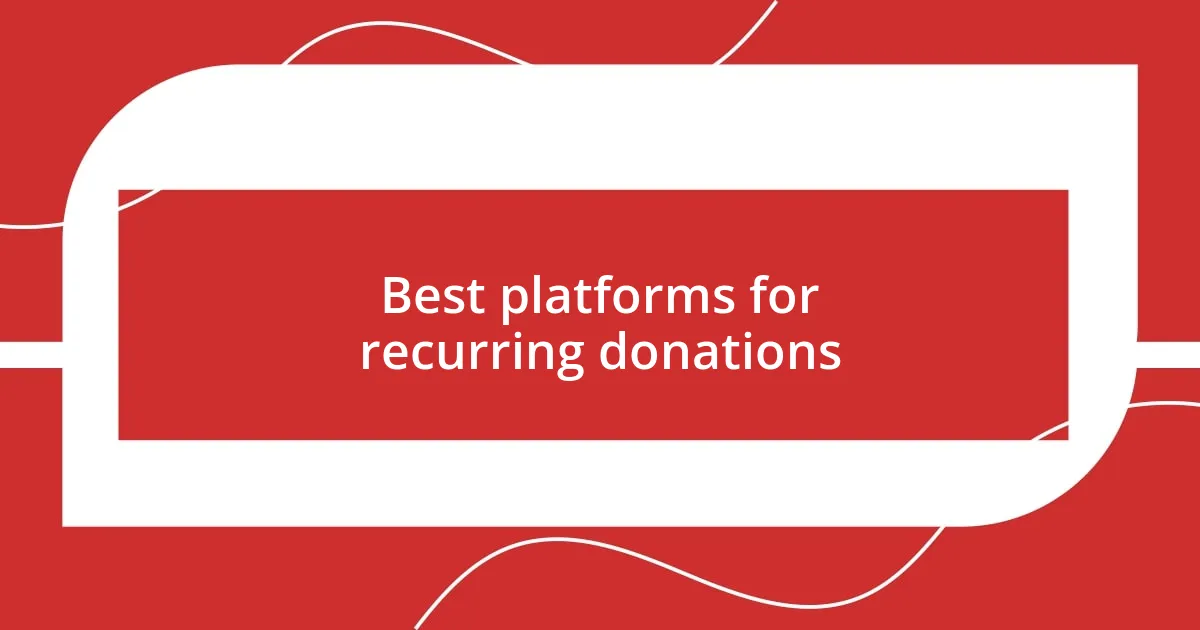
Best platforms for recurring donations
Choosing the right platform for recurring donations can make a significant difference in an organization’s fundraising success. From my experience, it’s essential to find a user-friendly interface that both donors and organizations can navigate easily. I remember when my favorite charity switched to a new donation platform. The process was so seamless that it encouraged me to set up a monthly contribution almost instantly.
Here are some of the best platforms for recurring donations I’ve come across:
- GiveLively: No fees, customizable pages, and easy integration with various channels.
- Donorbox: Offers a straightforward setup, multiple payment options, and donor management tools.
- PayPal: The convenience of a familiar platform, with options for recurring billing.
- Classy: Ideal for larger organizations, with robust analytics and campaign management features.
- Fundly: User-friendly for both donors and organizations, making it easy to share and promote campaigns.
When I first started exploring donation platforms, I prioritized features that fostered donor engagement. Platforms that provide personalized thank-you messages and engagement updates made me feel appreciated and connected. It’s unbelievable how a simple acknowledgment can turn a casual donor into a steadfast supporter.
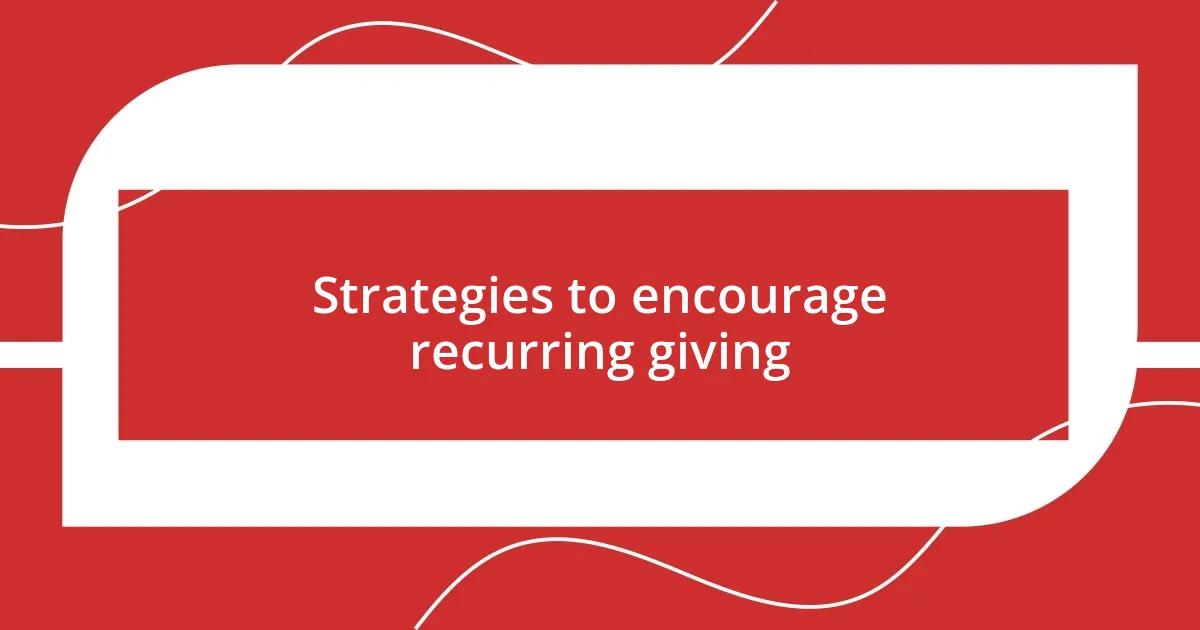
Strategies to encourage recurring giving
One effective strategy to encourage recurring giving is to communicate the impact of donations regularly. I recall receiving heartfelt updates from a charity I contributed to, showing how my monthly support was directly making a difference. It’s easy to forget the impact of our contributions, so sharing success stories and project outcomes can remind donors that their ongoing commitment truly matters. Wouldn’t it feel more rewarding to see exactly where our money goes?
Another approach is to offer incentives for recurring donors, such as exclusive content or invitations to special events. When I was invited to a behind-the-scenes tour because of my monthly support for a wildlife conservation group, it made me feel really valued as a donor. It’s these little perks that not only enhance the giving experience but also deepen the connection I felt with the organization. What if organizations could create more of these personal experiences? It could transform the way we engage with our causes.
Building a community around recurring donations is essential as well. I remember feeling a sense of connection with other supporters through a group chat initiated by a nonprofit I contributed to. Sharing our reasons for giving and supporting each other’s fundraising goals cultivated a strong sense of belonging. Isn’t it amazing how we can all come together to make a difference? Establishing such communities fosters loyalty and helps transform donors into passionate advocates for the cause.
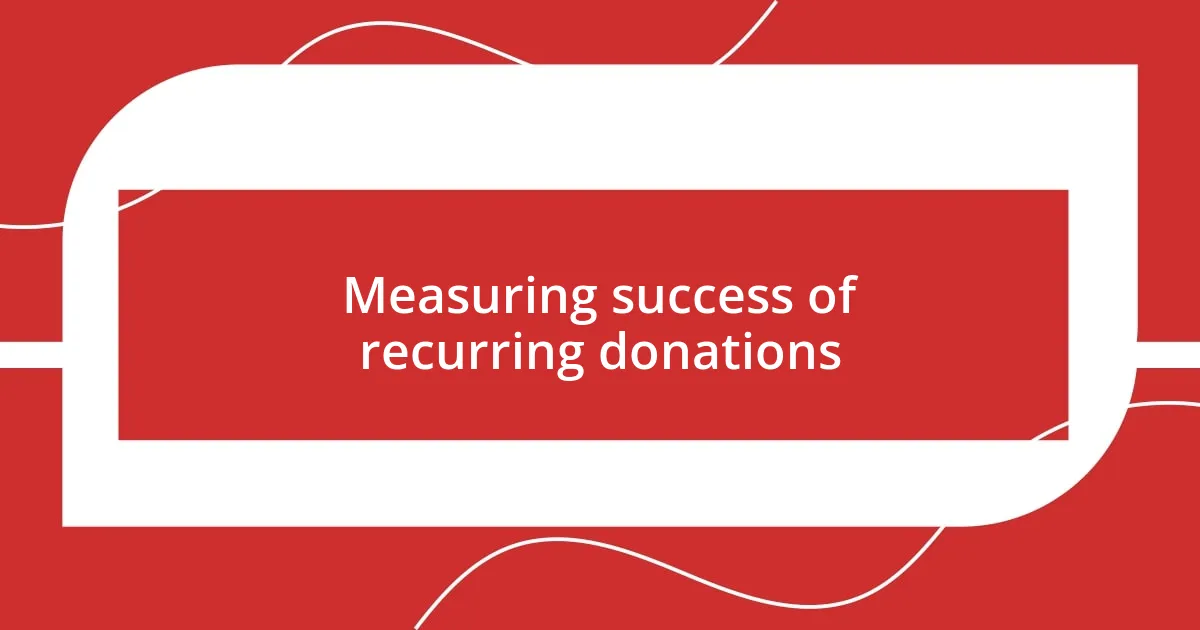
Measuring success of recurring donations
Measuring the success of recurring donations goes beyond just tracking numbers. In my experience, understanding donor retention rates provides invaluable insight into how effectively an organization engages its supporters. When I looked at my favorite charity’s retention statistics, it was clear their regular communication and impact reports made a significant difference—they held onto donors like me longer than most.
Another key metric is the lifetime value of a donor, which reflects how much a donor contributes throughout their relationship with an organization. I remember discovering that my continued support had helped fund multiple projects over the years, leading me to feel a deeper personal connection. Isn’t it powerful to consider how single recurring donations can accumulate into substantial support over time?
Finally, gathering feedback from donors is vital for measuring success. I once participated in a survey that asked for my thoughts on their programs and the giving experience. The organization’s willingness to listen made me feel heard and valued, reinforcing my commitment. How often do we really take the time to ask donors about their journeys? Adjusting based on this feedback can lead to a more positive experience, ultimately enhancing donor satisfaction and retention.










